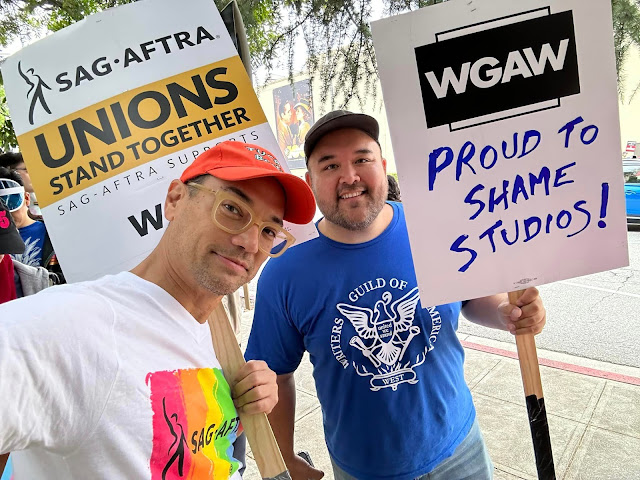Breaking Down The 2023 Writers Strike
Remember when you watched Friends (or still watch Grey’s Anatomy) and there were like 22-24 episodes in each season? Well, that involved a lot of writers —usually 9 to 11 working together in one room. And because those shows were so popular and successful, they went into syndication, which means reruns. And those writers (and actors) got residual payments because their work was still being aired —and still making money for the studio and whatever platform or station they ran on.
Now, say you watched Ted Lasso or Succession, a streaming comedy (Apple TV+) and a cable drama (HBO) that’s also streaming. These shows ran for 3 and 4 seasons, respectively, with an average of 10 episodes per season. This amount has become a standard for streaming and cable, which means less writers needed per show and less money paid to those writers (because, again, less episodes). And while these shows are considered hits, they’re not built for lucrative syndication/rerun deals because the studios that own them can keep streaming them for however long they like —WITHOUT paying writers and actors any residuals. This is possible because current contracts, based on old standards, don’t say anything about residuals for streaming, which is basically perpetual reruns, right?
Well, the Writers Guild of America is rightfully pissed and has been on strike (now in Week 11 as of this writing) because the group that represents all TV studios and producers like Disney/ABC, Paramount, Warner Bros, Hulu, Netflix, NBCUniversal, and Amazon (known as the AMPTP) is collectively making more money than ever while writers are making less, even though more content is being written and produced these days. (*599 scripted series ran/aired last year alone —compare that to the 200 that existed in 2010.)
And when you throw the threat of AI into the mix — technology the studios are considering to replace human writers — it makes this strike all the more vital and important.
Now, when you think of TV writers, you may think of Shonda Rhimes (Scandal, Grey’s, Bridgerton) and Ryan Murphy (Glee, American Horror Story), hugely successful scribes who’ve gone on to run their own shows and score rich development deals. They are like the top 2% of TV writers. The WGA represents roughly 12,000 members, most of whom are considered middle-class, relying on paychecks just like any working American citizen. And because there are less episodes to write on a series and a longer hiatus (time off) between seasons, it has become increasingly difficult to maintain a career and livelihood in an industry already known for crushing careers and livelihoods. This extends beyond writers; anyone related to a production is affected.
What does this mean for the average American viewer? Well, you may not sense a big change now, but your go-to sources of entertainment will be majorly disrupted. Come fall, there won’t be any comedies or dramas premiering new episodes on broadcast networks (ABC, NBC, CBS, Fox, The CW) because nothing will have been written for these shows now. Shortly after that, you may not see new series or new episodes of your favorite shows popping up in places like Netflix or HBO (the final season of Stranger Things hasn’t even been shot yet).
And with the Screen Actors Guild poised to join the writers on strike now that their contracts expired on June 30 (and they’re faced with the same existential threat), you can bet on a stronger unionized force that will rattle the greedy media giants even more. Actors have already been showing their support, stepping away from projects that have been shut down. (And yes, this will also affect movies eventually.) But when you get to the core of it all, when you peel away the layers, this is an American labor movement dealing with issues as old as time: rich bigwigs profiting off the work of laborers who don’t get their fair share of the pie.
Some industry insiders will say all this was inevitable ever since these studios caught “Streaming Fever.” Not only was it a chance for them to compete with a behemoth like Netflix — with their own original content — it was a chance to recycle nostalgic properties they already own for audiences they assume will eat up. Hence why you’re constantly seeing prequel series for Lord of the Rings, Game of Thrones, Grease, Friday the 13th, and Harry Potter and reboots of things that are too many to list here.
So…I hope all of that makes sense and clears things up. As someone who has many friends and colleagues in the union and would like to write something for the screen and join the WGA myself, I will continue to support the guild and join their efforts for as long as it takes. I hope you will too. I also hope you take the time to carefully read the opening and closing credits of your favorite show the next time you watch it —and think about the people behind those names you see on your screen, people whose lives are being affected (not just writers but those who work in editing, sound, wardrobe, lighting, hair/makeup, catering, animation, special effects, etc.) by this necessary but challenging moment in Hollywood history.
@TheFirstEcho



Comments